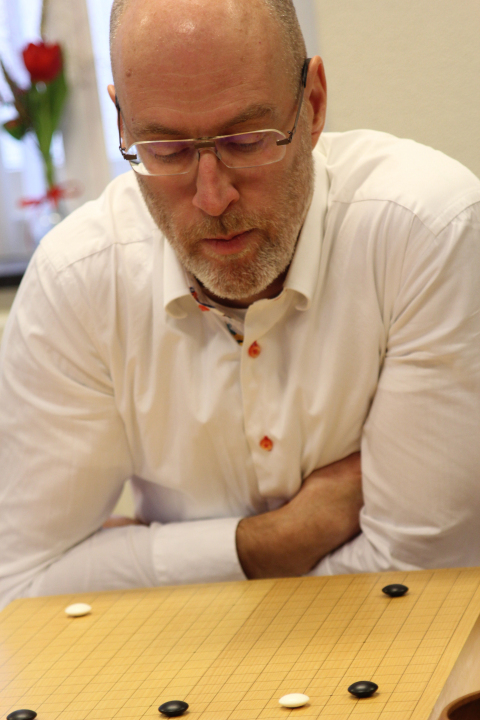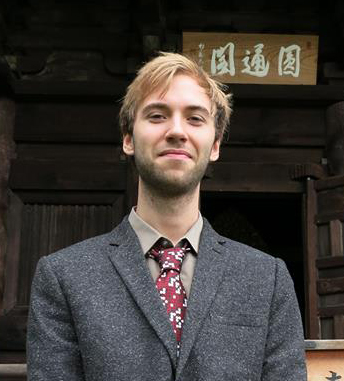The 2019 Dutch Go Championships was played in the weekends of 12-13th and 26-27th of January. It took place in the European Go Cultural Centre in Amstelveen. EuroGoTV was present to live broadcast the first board on KGS. A total of 39 players participated in this open championship in which all go players with Dutch citizenship and foreigners who have lived in the Netherlands for at least two years are eligible to play. An additional Dutch Women's Championship was held over four rounds to determine the strongest female player of the Netherlands.
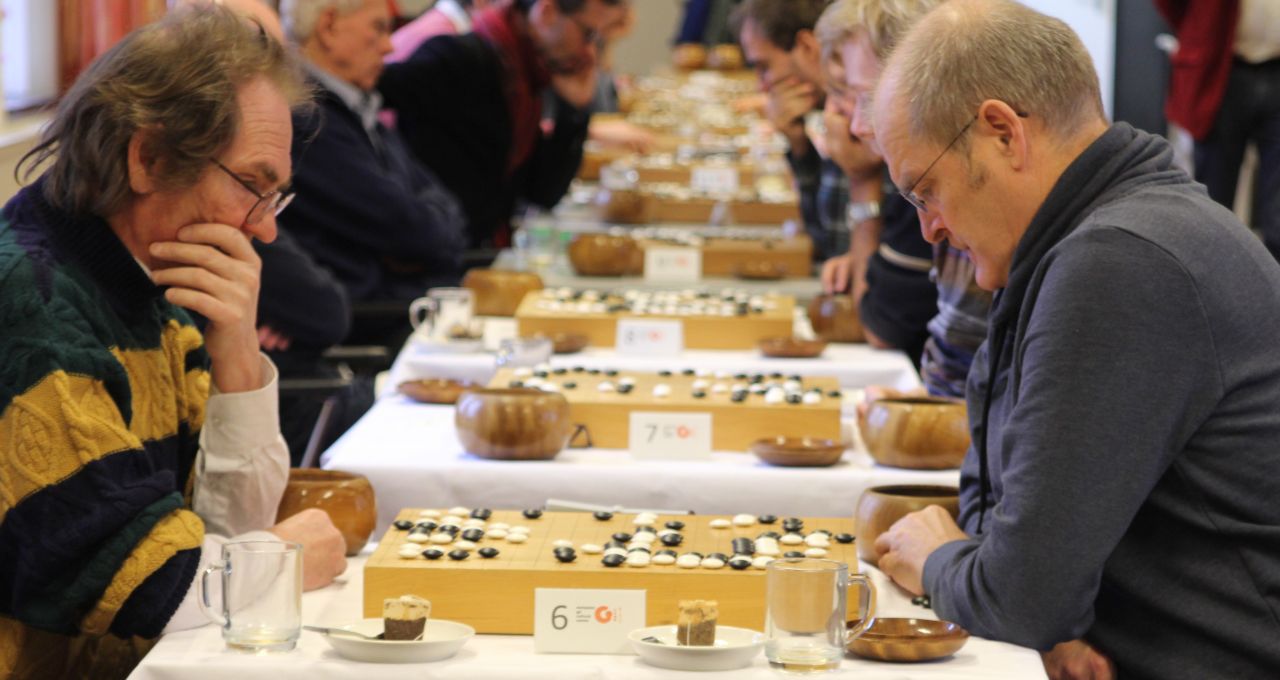
Impression of the 2019 Dutch Go Championships. Photo by EuroGoTV.
In the Dutch Women's Championship, Yvonne Roelofs 4 kyu proved too strong for her rivals, but it was not without difficulty. She defeated Marieke Overbeek 3 kyu and Mirjam Visscher 3 kyu, but lost to Els Buntsma 3 kyu in the second round. This meant a final round was neccesary to determine the winner, in which Yvonne defeated Marieke and took the title.
In the Overall Dutch Championship, seven rounds were played to decide the victor. It all came down to a final on the last day between two players that had scored 5 wins out of 6 matches: the experienced Geert Groenen 5 dan versus the future of Dutch go, Alexander Eerbeek 5 dan. Both had won the Dutch championships once before, so the outcome of this match would put one of them above the other in the hall of Netherlandish go fame.
A fine spectacle was guaranteed and a game in which the odds of Alexander winning seemed to only become more certain, suddenly had a huge turnaround when the 26 year old filled his own liberty by accident and an unforseen snapback ended the game abruptly. Geert Groenen 5 dan became Dutch champion for the second time at 50 years of age!
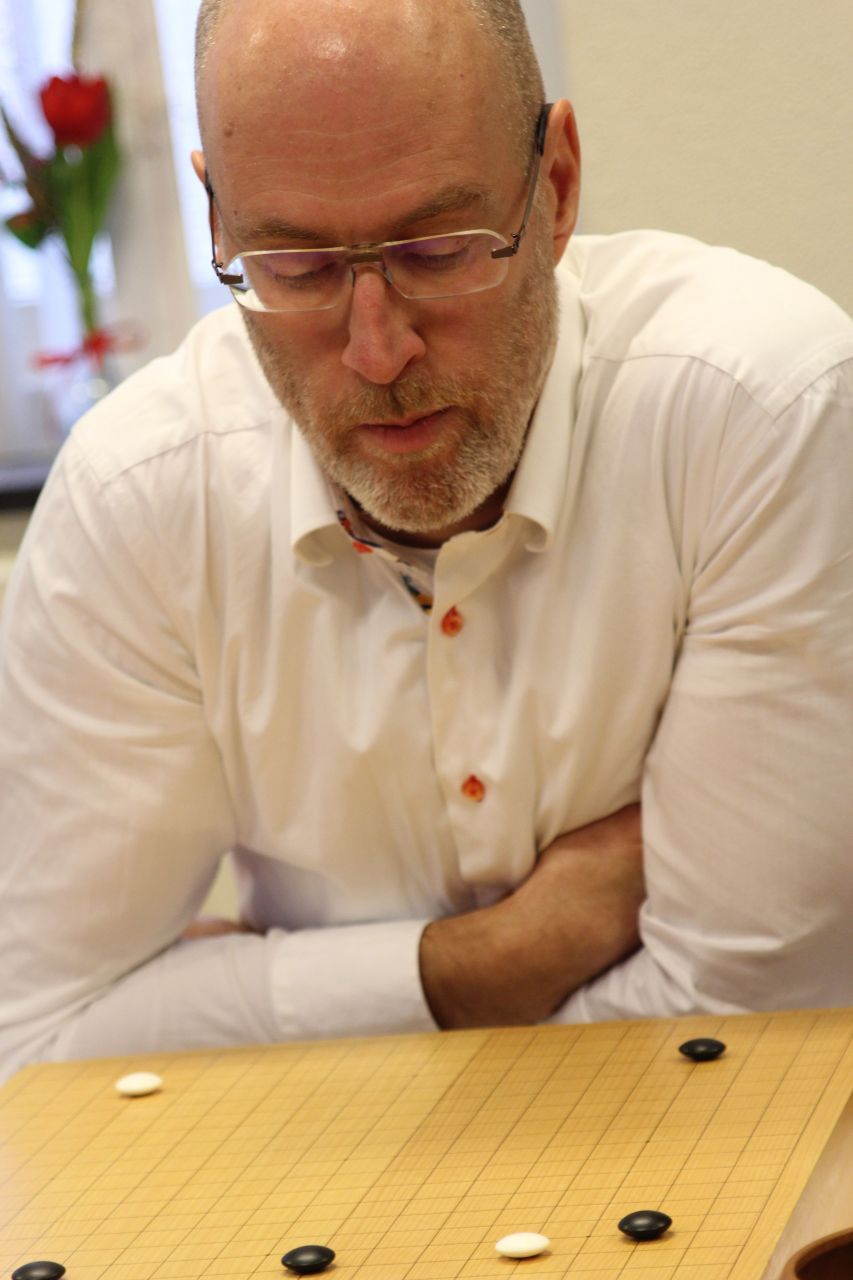
Dutch champion 2019: Geert Groenen.
Photo by EuroGoTV.
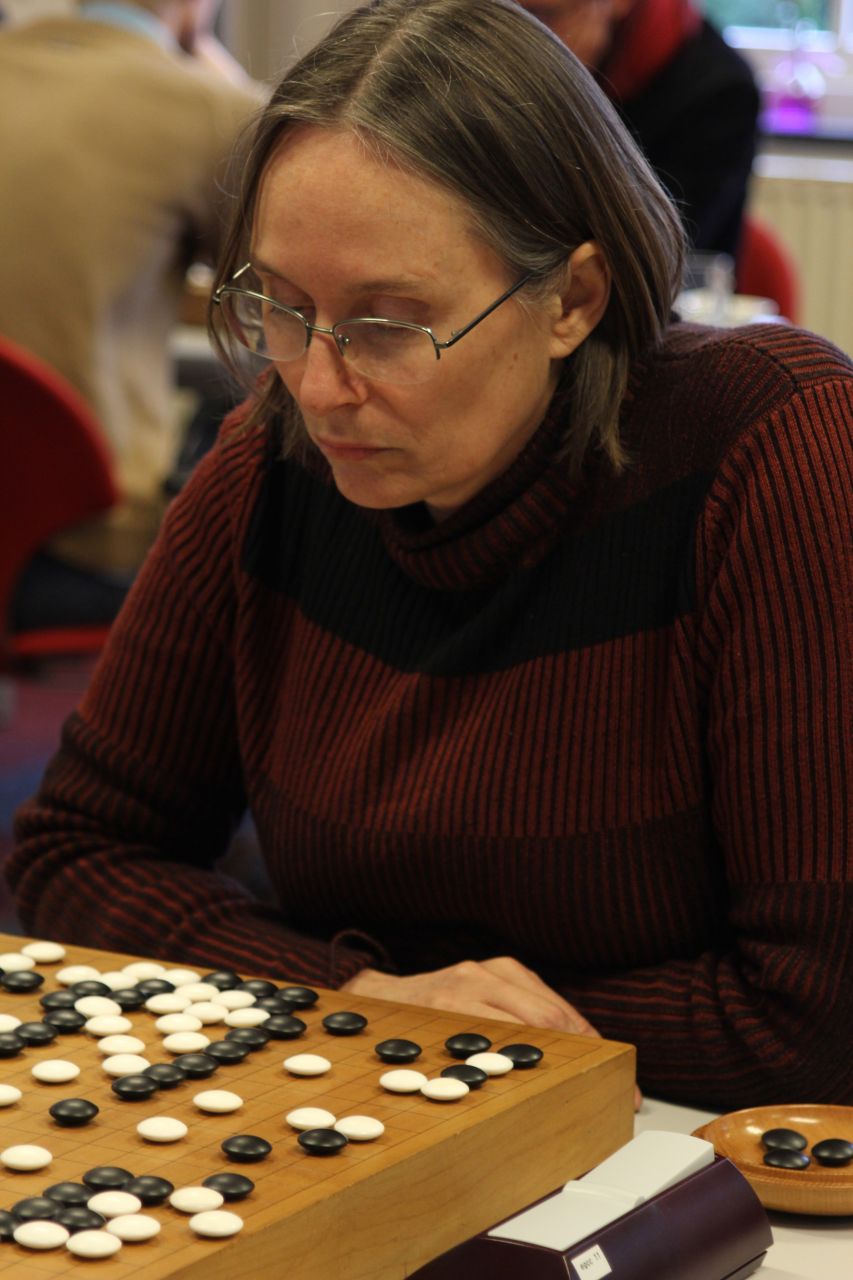
Dutch women's champion 2019: Yvonne Roelofs. Photo by EuroGoTV.
We caught up with Geert in an interview:
Hello Geert, thank you for your time. First of all, congratulations on winning your second Dutch title!
You are well known for your tallness and to non-Dutch go players for your terribly difficult name to pronounce. For those who don't know you, could you introduce yourself briefly?
I live and work in the beautiful city of The Hague. Currently I'm a project manager / scrum master at a government bank. It only has 300 employees, but is the fourth bank in the Netherlands if you look to the total balance sheet. I have fun working there. I'm single at the moment and have a stepson. If you ever visit The Hague and you request for a greet with a local through https://denhaag.greeters.info/nl/, you might get a tour by me.
When and how did you learn to play go?
My go career started when I was 17 years old and met a new classmate who thaught me to play. I could not have imagined then how that would affect my life. Pretty fast I was hooked on the game and because I was lucky enough to live near the biggest go club at that time (Eindhoven), with strong players like Frank Janssen, I improved at go quickly. Since then I have been to Asia more than ten times for invitation tournaments like the World Amateur Go Championship, the World Amateur Pair Go Championship, the Korea Prime Minister Cup and the Mindsport Games. I also visited and got to experience many places in Europe, which I would otherwise not have seen, thanks to go.
How would you characterise your style of play?
I like to think that I don't have a characteristic style of play and that I adjust my style to how the game evolves on the board.
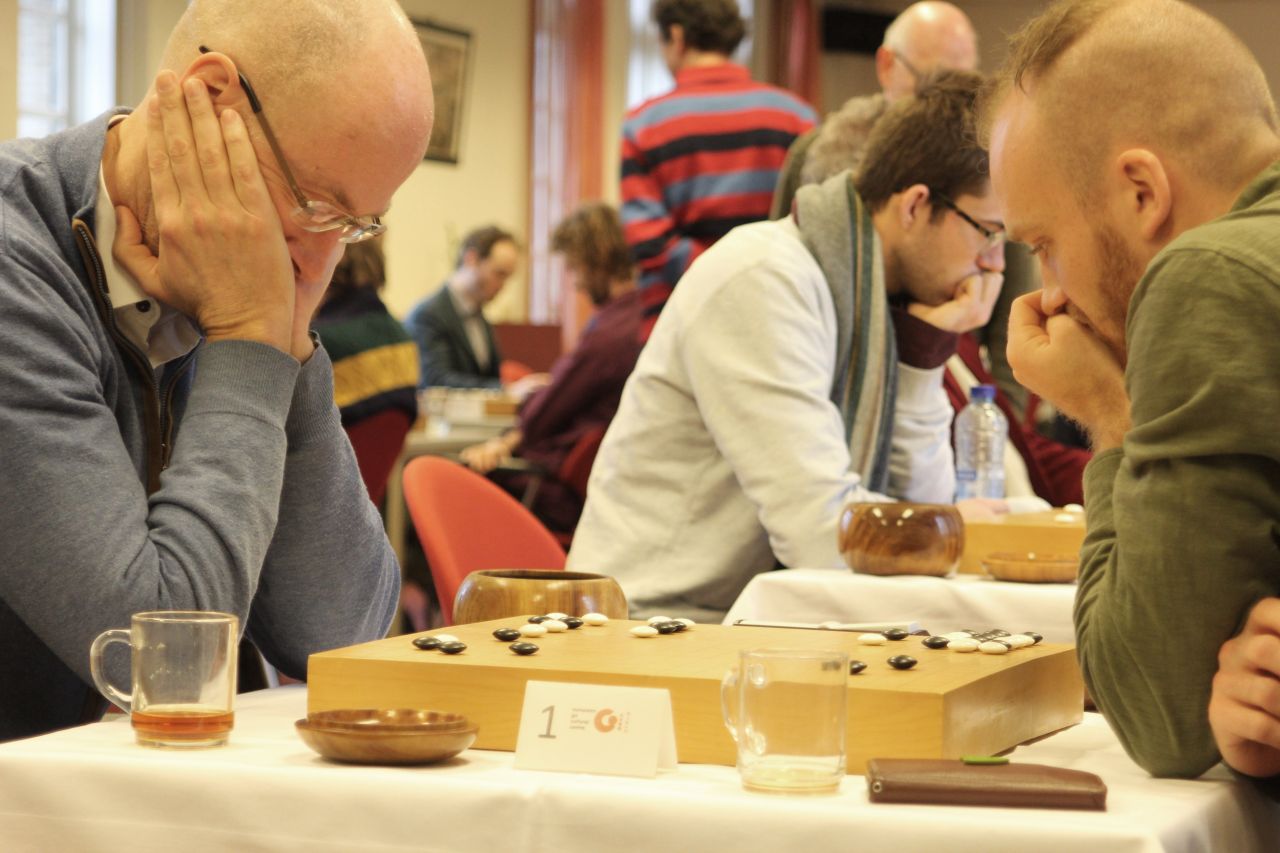
Photo by EuroGoTV.
In 2010 you won the Dutch Championship for the first time. Back then you defeated Peter Brouwer 6 dan in a best-of-three playoff final. How did it feel to become Dutch champion for the first time and how does that relate to your second victory in 2019?
In 2010 my title came as a sort of relief, after being second for about 5 or 6 times. I started to think that I was not able to deal with the stress of competition, so when I won in 2010, it felt like a burden had been lifted. My victory countered the stress. My 2019 title was kind of lucky, because in the final my opponent, Alexander Eerbeek, made a huge blunder. If that didn't happen, I would have lost the match for sure. The only relation between the 2010 and 2019 titles that I see is that in both cases it was relatively quiet at work. This ensured that I could focus completely on the championship.
What were your most difficult and favourite matches of the 2019 Dutch Championship and why?
In the first weekend all my wins were solid, and the difficult games took place in the second weekend against Michiel Tel and in the final against Alexander Eerbeek. Because of my wins in the first weekend I could afford a loss against Michiel. The final against Alexander started off okay, but then I wanted too much and my position started to fall apart. I had three or four weak groups, but because of an error on Alexander's part, I captured a big group. Those stones I captured had been seperating my groups, but after that everything was connected. He resigned immediately.
I think my favourite game was against Alexander in the first weekend, when I played him the first time. We were both very sharp and focused and played very well. You need two players to have a good game.
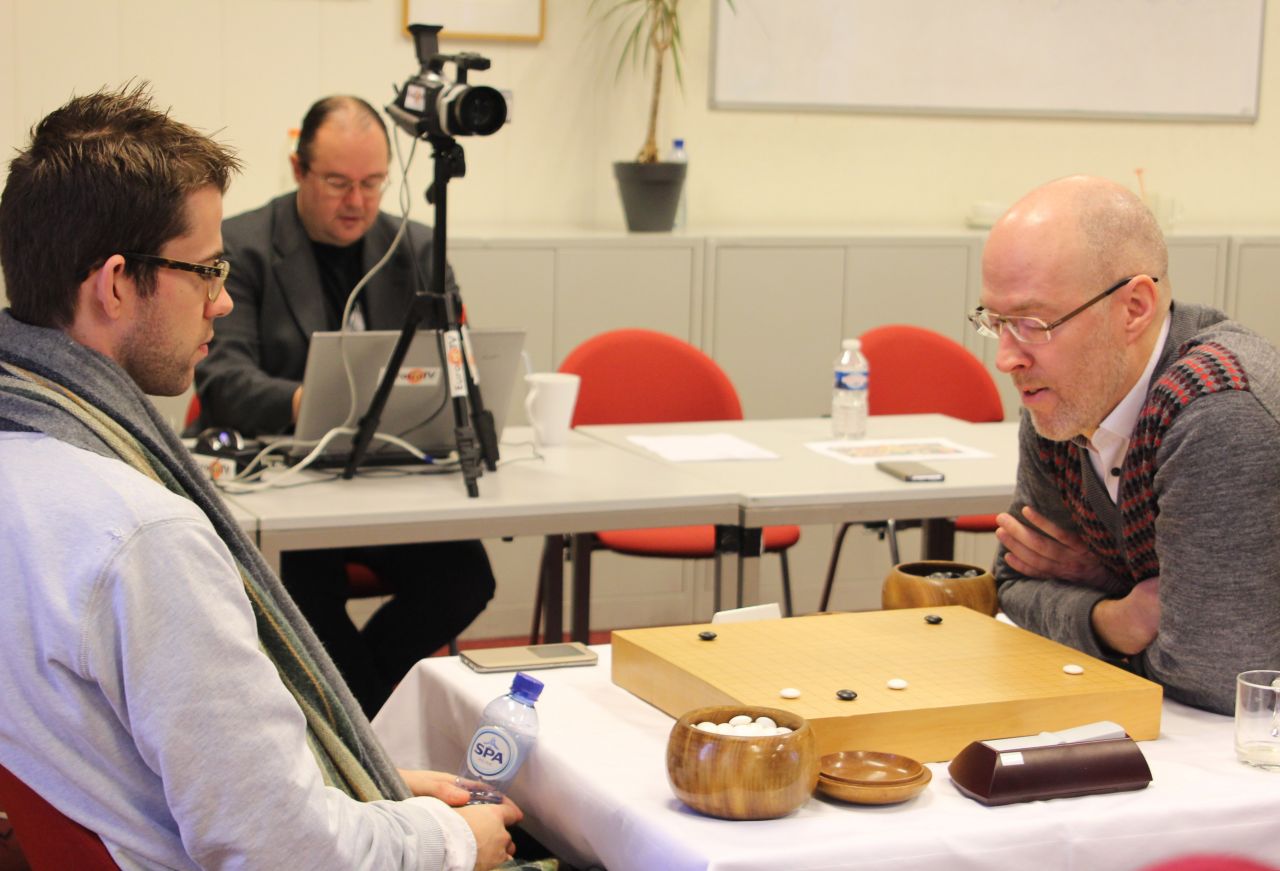
Photo by EuroGoTV.
Do you have a role model in go? Who are your favourite players?
I don't think I have a role model in go and I also don't have favourite players. At this moment I like a lot the professional games in which the influence of AI is clearly visible. AI has such a huge impact on the way strong players are playing the game and I think it's truly amazing.
The level of European go has grown tremendously over the years. There was a time when 5 dan players were fighting to be the European champion. Then the first Europeans went to Japan to study go in the nineties and became professional go players. Nowadays we have EGF professionals and the huge influence of AlphaGo and other computer programs. You have seen go change over the years, what would you say are the main differences in the go community between when you first started playing and now, in the Netherlands and on a European level?
By far the biggest difference is that there is Internet nowadays and when I started go, there was not. When I started to play go, I played in the competition ladder of the local go club and went to tournaments every month or so. We studied go from books, which are now replaced by apps, strong go programs and online go schools. There are so many more possibilities to play go online and to be taught by excellent online teachers.
If there is one thing you could say to the European youth players of today, what would you advise them?
If you want to get stronger, play many, many games and join an online go school. I noticed in the last years that my level was gradually going down, but since I joined the Yunguseng Dojang internet go school in 2017, my level has at least stayed the same and has probably gone up. Another advice I have for the youth players of today is to not only play online, but also visit tournaments and especially go camps. Camps are always fun and you will see that go players are a lot of fun to be with.
Thank you very much for this interview!





